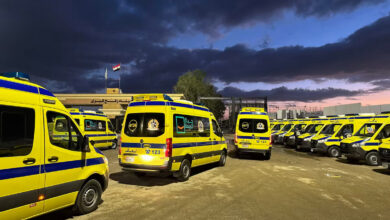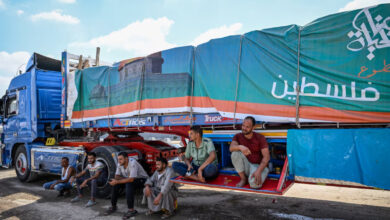Arish–The first of two passenger airplanes–part of the fifth and largest Viva Palestina convoy–arrived in Egypt Wednesday evening on its final stop before heading on to the Gaza Strip. The arrival in Arish port city follows an 18-day clearance delay in Latakia, Syria.
The second passenger airplane is scheduled to land at Al-Arish on Thursday. Each aircraft carries 155 delegates and activists from around the world. An aid ship with a cargo of 30 delegates and several tons of humanitarian aid is also set to dock at the Egyptian port city Thursday.
Viva Palestina describes itself as "A Lifeline to Gaza."
The convoy hopes to unload and transport its aid cargo to Gaza on Thursday. Egypt previously denied entrance to 18 members of the convoy, including former British MP George Galloway.
Following lengthy negotiations, Egyptian authorities agreed to grant the Viva Palestina activists access into the Gaza Strip for three days. From Colorado, independent activist Guy Benintendi, one of three Americans partaking in the convoy, said "we are pawns in the hands of the Egyptian government." He blamed the 18-day delay on "diplomatic and bureaucratic obstacles." Israel and other states may be behind this delay, he added.
One of the convoy's chief organizers, the Palestinian-English Zaher al-Berawi, said Viva Palestina, international institutions, the Egyptian government, the Egyptian people, and all the free people of the world, hope and strive to end the siege on Gaza. He praised "the Egyptian government's efforts, and its coordination with us to make this dream a reality."
The convoy includes 140 vehicles and a total of 340 delegates from 30 countries, according to al-Berawi. He added that over 80 percent of the aid is in the form of medical supplies, 10 percent in educational material and school supplies, and another 10 percent are emergency and relief equipment. The supplies are valued at US$5 million.
"The aid does not include any building materials [concrete, reinforced steel, pipes, etc.] as it was not allowed according to the agreements we had concluded with the Egyptian Embassy in Damascus," al-Berawi told Al-Masry Al-Youm. Jordanian associations and trade unions intended to deliver construction materials as part of the convoy but were not permitted to join, he added.
Israeli authorities have explicitly prevented the entrance of all such construction materials into the besieged Gaza Strip since 2007.
Even after its devastating war against Gaza from December 2008 to January 2009, Israel maintained its stance.
Egypt had similarly closed off its Rafah border crossing with the Gaza Strip after Hamas seized power in 2007. Egyptian authorities re-opened the Rafah border following the Israeli attack on the Freedom Flotilla to Gaza, in which eight Turks and one Turkish-American were killed by Israeli commandos.
One of the 115 Algerian activists participating in the convoy, former Algerian MP Mohamed Douibi was previously part of the Freedom Flotilla. He was aboard the ship that bore the brunt of this Israeli attack, the Mavi Marmara. He pointed to his injured eye and said, "Israeli commandos boarded the ship I was on and fired a rubber bullet at my face. It hit me in the eye, and I'm still being treated for this injury I sustained."
"This assault made me even more adamant in my decision to defy Israel's siege on Gaza. This is why I am participating in this convoy."
This is the first Viva Palestina convoy in which he has participated. He said that he intends to partake in forthcoming Viva Palestina convoys "until the siege is lifted."
John Hurson, from Tyrone Ireland, one of eight Irish delegates partaking in this convoy, described Egypt's decision to deny entrance to 18 activists as "ridiculous."
"The Egyptian government told the world that it would open its border with Gaza indefinitely," said Hurson. "It has now become obvious that this announcement is a lie." Egypt's decision to bar these activists "puts more of a spotlight on Egypt as being a party complicit in this siege," he added.
George Galloway is considered persona non grata by the Egyptian government. He was barred from entering Egypt during the Viva Palestina 3 convoy attempt which arrived in the Port of Arish in January, 2010. Having waited for several days in the Jordanian Port of Aqaba, for clearance from Egyptian authorities, it was then ordered to be rerouted to Latakia. The convoy arrived in the Syrian port only to be delayed for several more days.
Upon arrival in Arish, the convoy waited again for clearance. Impatience and frustration led some activists to break down one of the port's gates. Clashes between Viva Palestina activists and Egyptian police ensued. More than 20 members of the convoy were injured, along with around 10 policemen.
Mahmoud Khaled, one of 90 Viva Palestina 5 activists from Jordan said, "we're happy to be in Egypt, but we'll be even happier when we get into the (Gaza) Strip and are able to deliver our aid to that besieged populace."
He added that nine Jordanians were denied entrance into Egypt, including 83-year-old Ismail Nashwan. Egyptian authorities reportedly claimed that Nashwan is a Turkish troublemaker, "although he is not a Turk, and is too old to be a troublemaker," according to Khaled.
The Viva Palestina 5 convoy originated in London. It departed Saturday, 18 September and drove southwestwards through Europe and Turkey, and arrived in Latakia on Saturday, 2 October. In Latakia, the convoy was joined by two other contingents from Algeria and Morocco.




